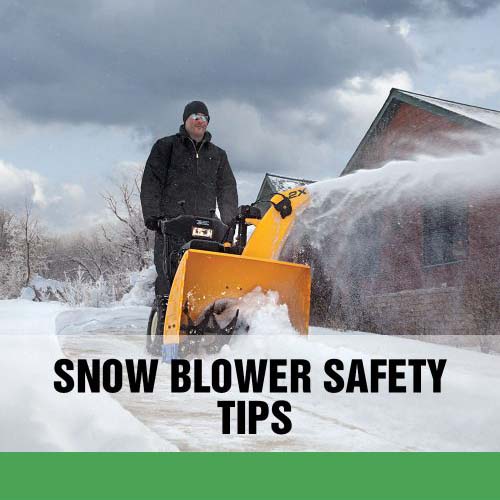When it’s time to clear snow from your drive and walkways, nothing lightens your workload like a powerful snow blower. While there are multiple benefits to using a snow blower, there are also dangers to watch out for. Use these snow blower safety tips and you can enjoy a stress-free winter.
Safety Tip #1: Be Smart About Using Your Snow Blower
Do not start your snow blower in any indoor area such as inside your garage or shed because fumes from the machine are dangerously toxic in enclosed spaces. Always make sure you are operating your snow blower in an open, outdoor area.
After starting your snow blower, be aware of your surroundings and stop the machine if people, animals, or unexpected objects appear in your path. Always point your chute away from anything or anyone that could be damaged or hurt and be careful of your footing when walking on icy surfaces. Also, avoid operating your machine when bad weather impacts visibility.
Safety Tip #2: Be Aware of Your Surroundings
In addition to watching for people or animals in your path, be sure to remove any rocks, sticks, or other objects that could be picked up and thrown by the snow blower.
If you live on a steep hill, consider using an alternative snow removal method because using a snow blower can be dangerous in places where you might lose your footing. If you must use your snow blower to clear a gravel driveway, use a two- or three-stage blower and adjust the height to pass over loose rocks. Lastly, never use a single-stage snow blower on rocky paths because small stones can be picked up and tossed into the air.
Safety Tip #3: Know Your Snow Blower
It’s important to know everything about your snow blower before starting it up. Read your owner’s manual, learn how to shut off your machine in case of emergency, and make sure you know how to use all of the features on your machine.
Do not let children under 15 operate a snow blower. For children 15 and over, make sure you go over all snow blower safety rules and functions prior to operation.
Safety Tip #4: Make Sure Everything Works Properly
Snow blower safety depends heavily on the condition of your machine. Damaged blowers are more likely to malfunction, so it’s important to make sure that everything is in good shape and works properly.
Make sure tires are inflated; check the clutch, the chute, and the blower system for any wear and tear. Also ensure that all extension cords (for electric snow blowers) are designed for outdoor use and are not fraying.
Safety Tip #5: Always Wear Protective Gear
Always wear eyewear, in case of flying objects. Wear gloves to protect your hands from the cold, boots with good traction, and earplugs to protect your ears from loud snow blower noise. Make sure all clothing is fitted and avoid wearing loose scarves or dangling jewelry because these can get caught in the snow blower while it’s running.
Snow blower Safety Tip #6: Consider Your Health
Snow blowers are designed for convenience but individuals with heart, back, or other medical conditions could be negatively impacted by the physical exertion of using a snow blower. Check with your doctor to see if this activity is safe for you, and consider hiring an outside service to clear your driveway if you have any concerns about your health or safety.
Becoming knowledgeable about your snow blower and using common sense will take you far when it comes to snow blower safety. Read instructions and follow the rules and removing snow should be quick and easy.
Snow Blower Safety Tips
Super Admin

